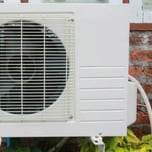
Get up to 4 quotes by filling in only 1 quick form

Slash your energy bills by installing a heat pump

We’ve helped over 500,000 homeowners reduce their carbon footprint
- GreenMatch
- Water Source Heat Pumps
- Water Source Heat Pump Cost
Water Source Heat Pump Cost
Water Source Heat Pump Costs
The initial cost of installing a water source heat pump can be relatively expensive when compared to other types of heat pumps. The estimated price of a water source heat pump is around £10,000. The advantage of buying a water source heat pump is that the energy costs are going to be much lower in the long run. Low operating costs will result in diminished utility bills.
Are you ready to take the first step towards a more sustainable and cost-effective heating solution? Get in touch with our network of professional providers to learn more about how heat pumps can benefit your home or business. We’ll provide you with up to 3 free, no-obligation quotes and guide you through the process from start to finish. Get started by simply clicking the link below:
- Quotes from local engineers
- Payment by finance available
- Save up to £1100 per year
It only takes 30 seconds



Who Will Benefit from Water Source Heat Pump?
Traditional water source heat pump systems are built for properties where there is a simultaneous need for heating and cooling throughout the year. Water source heat pumps produce heat similarly to ground source heat pumps. Pipes are placed under the water in a lake, river or stream, where the water temperature is constant at a level of between 7 to 12 degrees. The liquid in the pipes draws up the heat, which is then passed to a heat pump situated inside the household.
Water source heat pump is a part of a geothermal heating and air conditioning system. A water source heat pump uses water or a water/refrigerant mix to both heat and cool your property. There are two types of water source heat pumps: closed loop and open loop. With an open loop, water from a source like a river or a lake is drawn into a pipe and led to the heat exchanger where heat is released. The water is then returned to the initial source. In a closed loop system, a refrigerant is led through a closed loop of pipes and it absorbs the heat from the ground.
The reason why water source heat pumps are so energy-efficient is that they are suitable for balancing energy needs – they eliminate energy waste by finding a use for it elsewhere in the household. Water source heat pumps are an attractive alternative for properties situated near a suitable water source – they will allow both heating and cooling of separate spaces; they are easy to maintain, function quietly and there are no visible external units.

What Are the Running Costs of a Water Source Heat Pump?
There are basically three factors that affect the running cost of a water source heat pump, which are similar to the running cost of an air source heat pump: the size of the property and the amount of energy needed for heating it; the operating efficiency of the water source heat pump and the temperature of the source of energy.
The coefficient of performance (COP) of a water source heat pump can be as much as COP 5, whereas the standard COP for heat pumps is in the range of 3.0 to 4.3. The efficiency of a heat pump signifies the amount of work it has to perform – the variation between indoor and outdoor temperature degrees. The running costs will also depend on the desired temperature output. The smaller the gap of temperature differences, the less the heat pump needs to work and therefore the operating costs will be lower. However, to achieve temperatures of 65°C or more, the heat pump’s efficiency will fall and running costs will increase.
The most common reason for unreasonably high running costs is faulty installation or installation in ill-suited properties.
Why Choose a Water Source Heat Pump?
Using water source heat pump as an energy source has a number of advantages when compared to air or ground source heat pumps:
- The heat transfer rate from water is much higher than from air or ground.
- The constant flow of the water means that there is a continual energy replacement.
- There is no need to dig large trenches to install the water source heat compared to a ground source heat pump. That also makes the installing process less costly.
- The return temperature of the water is generally higher than the one of winter air or ground, increasing the performance efficiency of the heat pump.
- Choosing water source heat pump over conventional energy sources will significantly reduce carbon emissions.
Water source heat pump reduces monthly heating and cooling costs. The monthly utility bill decreases approximately by 15 percent after installing this efficient system.
Get Free Quotes on Water Source Heat Pumps
Are you interested in comparing quotes to ensure the best deal in water source heat pumps? Luckily GreenMatch is here to help! Simply fill in the contact form below and tell us about your needs and preferences, and we’ll provide up to 3 quotes to connect you with our qualified suppliers. The service is totally free and without obligation!
- Quotes from local engineers
- Payment by finance available
- Save up to £1100 per year
It only takes 30 seconds



 We strive to connect our customers with the right product and supplier. Would you like to be part of GreenMatch?
We strive to connect our customers with the right product and supplier. Would you like to be part of GreenMatch? 



